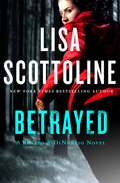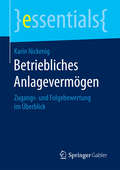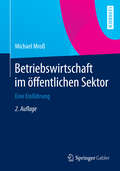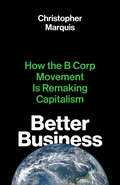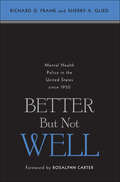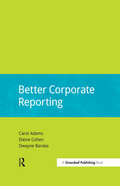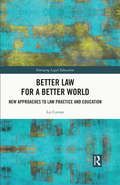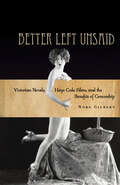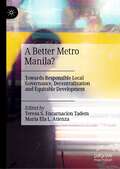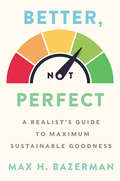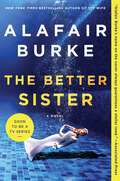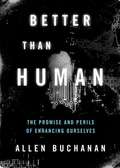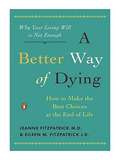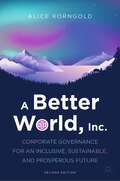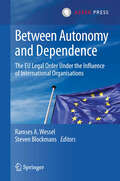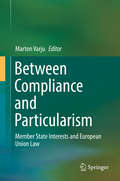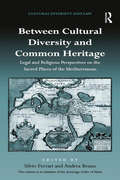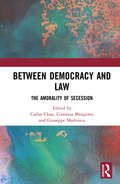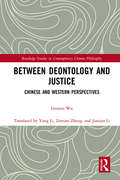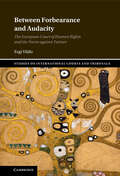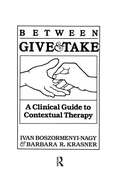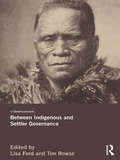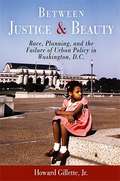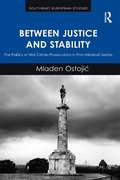- Table View
- List View
Betrayed
by Lisa ScottolineBlockbuster author Lisa Scottoline returns to the Rosato & Associates law firm with Betrayed, and maverick lawyer Judy Carrier takes the lead in a case that's more personal than ever. Judy has always championed the underdog, so when Iris, the housekeeper and best friend of Judy's beloved Aunt Barb, is found dead of an apparent heart attack, Judy begins to suspect foul play. The circumstances of the death leave Judy with more questions than answers, and never before has murder struck so close to home. In the meantime, Judy's own life roils with emotional and professional upheaval. She doesn't play well with her boss, Bennie Rosato, which jeopardizes her making partner at the firm. Not only that, her best friend Mary DiNunzio is planning a wedding, leaving Judy feeling left behind, as well as newly unhappy in her relationship with her live-in boyfriend Frank. Judy sets her own drama aside and begins an investigation of Iris's murder, then discovers a shocking truth that confounds her expectations and leads her in a completely different direction. She finds herself plunged into a shadowy world of people who are so desperate that they cannot go to the police, and where others are so ruthless that they prey on vulnerability. Judy finds strength within herself to try to get justice for Iris and her aunt -- but it comes at a terrible price.
Betriebliches Anlagevermögen: Zugangs- und Folgebewertung im Überblick (essentials)
by Karin NickenigKarin Nickenig befasst sich in diesem essential mit der Zusammensetzung des Anlagevermögens sowie der Zugangs- und Folgebewertung von Anlagegütern. Der Band ermöglicht einen schnellen Überblick hinsichtlich möglicher Abschreibungen. Die Betrachtung von Geringwertigen Wirtschaftsgütern und relevanten Vorschriften zur Umsatzsteuer/Vorsteuer ist ein weiterer wesentlicher Bestandteil dieser Lektüre.
Betriebswirtschaft im öffentlichen Sektor: Eine Einführung
by Michael MroßDie Öffentliche Betriebswirtschaftslehre befasst sich mit Institutionen, die Güter für die Allgemeinheit bereitstellen und damit öffentliche Aufgaben erfüllen. Dieses Buch bietet einen anschaulichen und kompakten Einstieg in die Betriebswirtschaftslehre am Beispiel des öffentlichen Sektors. Der Aufbau entspricht den betriebswirtschaftlichen Grundfunktionen Finanzierung, Beschaffung, Marketing, Rechnungswesen, Produktion und Management. Jedes Kapitel enthält Wiederholungsfragen zur Anregung eigener Überlegungen und zur gezielten Prüfungsvorbereitung.
Better Business: How the B Corp Movement Is Remaking Capitalism
by Christopher MarquisA compelling look at the B Corp movement and why socially and environmentally responsible companies are vital for everyone&’s future Businesses have a big role to play in a capitalist society. They can tip the scales toward the benefit of the few, with toxic side effects for all, or they can guide us toward better, more equitable long-term solutions. Christopher Marquis tells the story of the rise of a new corporate form—the B Corporation. Founded by a group of friends who met at Stanford, these companies undergo a rigorous certification process, overseen by the B Lab, and commit to putting social benefits, the rights of workers, community impact, and environmental stewardship on equal footing with financial shareholders. Informed by over a decade of research and animated by interviews with the movement&’s founders and leading figures, Marquis&’s book explores the rapid growth of companies choosing to certify as B Corps, both in the United States and internationally, and explains why the future of B Corporations is vital for us all.
Better But Not Well: Mental Health Policy in the United States since 1950
by Richard G. Frank Sherry A. GliedThe past half-century has been marked by major changes in the treatment of mental illness: important advances in understanding mental illnesses, increases in spending on mental health care and support of people with mental illnesses, and the availability of new medications that are easier for the patient to tolerate. Although these changes have made things better for those who have mental illness, they are not quite enough. In Better But Not Well, Richard G. Frank and Sherry A. Glied examine the well-being of people with mental illness in the United States over the past fifty years, addressing issues such as economics, treatment, standards of living, rights, and stigma. Marshaling a range of new empirical evidence, they first argue that people with mental illness—severe and persistent disorders as well as less serious mental health conditions—are faring better today than in the past. Improvements have come about for unheralded and unexpected reasons. Rather than being a result of more effective mental health treatments, progress has come from the growth of private health insurance and of mainstream social programs—such as Medicaid, Supplemental Security Income, housing vouchers, and food stamps—and the development of new treatments that are easier for patients to tolerate and for physicians to manage. The authors remind us that, despite the progress that has been made, this disadvantaged group remains worse off than most others in society. The "mainstreaming" of persons with mental illness has left a policy void, where governmental institutions responsible for meeting the needs of mental health patients lack resources and programmatic authority. To fill this void, Frank and Glied suggest that institutional resources be applied systematically and routinely to examine and address how federal and state programs affect the well-being of people with mental illness.
Better Corporate Reporting (Doshorts Ser.)
by Carol Adams Elaine Cohen Dwayne BarakaBetter Corporate Reporting outlines the latest frameworks for enhancing non-financial and sustainability reporting. It shows you how to integrate non-financial data into your reporting and overall strategy, creating long-term value, trust and transparency. It includes guides to: the International Integrated Reporting Council's new framework; the Global Reporting Initiative's G4 framework; and a detailed look at the concept at the heart of both of these new frameworks, materiality. It is the compilation of 3 bestselling sustainability guides on sustainability reporting.Understanding Integrated Reporting provides a practical and expert distillation of the new IR framework released by the International Integrated Reporting Council in December 2013. It explains what IR is and how to do it; how it links with other reporting frameworks and what it means in terms of thinking and processes. You'll also get a clear business case for IR and insights and best practice examples from leading integrated reporters. The Global Reporting Initiative (GRI) G4 Sustainability Reporting Framework was launched in May 2013. In Understanding G4, corporate reporting veteran Elaine Cohen presents an easy-to-follow review of everything any organization needs to know to decide whether to use the G4 Framework and if so, how. Materiality is the lynch-pin that can align your sustainability initiatives with your overall strategy. Making Sustainability Matter shows you how to identify your organization's most material sustainability issues, allocate resources to sustainability initiatives for optimal returns; connect your communications and reporting to materiality, and; clarify which issues are important to your stakeholders. Materiality is a core concept in both the GRI's new G4 framework the IIRC's new Integrated Reporting framework.
Better Law for a Better World: New Approaches to Law Practice and Education (Emerging Legal Education)
by Liz CurranHow as a society can we find ways of ensuring the people who are the most vulnerable or have little voice can avail themselves of the protection in law to improve their social, cultural, health and economic outcomes as befits civilised society? Better Law for a Better World answers this question by looking at innovative practices and developments emerging within law practice and education and shares the skills and techniques that could lead to confidence in the law and its ability to respond. Using recent research from Australia, practice initiatives and information, the book breaks down ways for law students, legal educators and law practitioners (including judicial officers, law administrators, legislators and policy makers) to enhance access to justice and improve outcomes through new approaches to lawyering. These can include: Multi-Disciplinary Practice (including health justice partnerships); integrated justice practice; restorative practice; empowerment modes (community & professional development and policy skills); client-centred approaches and collaborative interdisciplinary practice informed by practical experience. The book contains critical information on what such practice might look like and the elements that will be required in the development of the essential skills and criteria for such practice. It seeks to open up a dialogue about how we can make the law better. This includes making the community more central to the operation of the law and improving client-centred practice so that the Rule of Law can deliver on its claims to serve, protect and ensure equality before the law. It explores practical ways that emerging lawyers can be trained differently to ensure improved communication, collaboration, problem solving, partnership and interpersonal skills. The book explores the challenges of such work. It also gives suggestions on how to reduce professional barriers and variations in practice to effectively, humanely and efficiently make a difference in people’s lives. The book builds essential skills and new approaches to lawyering for law students, legal educators, new lawyers and seasoned lawyers, judicial members and law administrators to equip them to better respond to community need. It looks at the law in context by also exploring the role of the law in improving the social determinants of health and socially just outcomes.
Better Left Unsaid: Victorian Novels, Hays Code Films, and the Benefits of Censorship
by Nora GilbertBetter Left Unsaidis in the unseemly position of defending censorship from the central allegations that are traditionally leveled against it. Taking two genres generally presumed to have been stymied by the censor's knife--the Victorian novel and classical Hollywood film--this book reveals the varied ways in which censorship, for all its blustery self-righteousness, can actually be good for sex, politics, feminism, and art. As much as Victorianism is equated with such cultural impulses as repression and prudery, few scholars have explored the Victorian novel as a "censored" commodity--thanks, in large part, to the indirectness and intangibility of England's literary censorship process. This indirection stands in sharp contrast to the explicit, detailed formality of Hollywood's infamous Production Code of 1930. In comparing these two versions of censorship, Nora Gilbert explores the paradoxical effects of prohibitive practices. Rather than being ruined by censorship, Victorian novels and Hays Code films were stirred and stimulated by the very forces meant to restrain them.
A Better Metro Manila?: Towards Responsible Local Governance, Decentralization and Equitable Development
by Teresa S. Encarnacion Tadem Maria Ela L. AtienzaThis book contributes to efforts in furthering the democratization and development processes in the Philippines by examining the decentralization efforts in Metro Manila. It explores existing as well as proposed development models for governance with focus on the effective and efficient delivery of social services, bringing forth growth with equity through development efforts, and addressing national-local concerns to promote political and socio-economic stability in the country. In doing so, the book examines the strong and weak governance points in the National Capital Region of the Philippines, and identifies areas for reform.
Better, Not Perfect: A Realist's Guide to Maximum Sustainable Goodness
by Max H. BazermanNegotiation and decision-making expert Max Bazerman explores how we can make more ethical choices by aspiring to be better, not perfect.Every day, you make hundreds of decisions. They’re largely personal, but these choices have an ethical twinge as well; they value certain principles and ends over others. Bazerman argues that we can better balance both dimensions—and we needn’t seek perfection to make a real difference for ourselves and the world.Better, Not Perfect provides a deeply researched, prescriptive roadmap for how to maximize our pleasure and minimize pain. Bazerman shares a framework to be smarter and more efficient, honest and aware—to attain your “maximum sustainable goodness.” In Part Two, he identifies four training grounds to practice these newfound skills for outsized impact: how you think about equality and your tribe(s); waste—from garbage to corporate excess; the way you spend time; and your approach to giving—whether your attention or your money. Ready to nudge yourself toward better, Part Three trains your eye on how to extend what you’ve learned and positively influence others.Melding philosophy and psychology as never before, this down-to-earth guide will help clarify your goals, assist you in doing more good with your limited time on the planet, and see greater satisfaction in the process.
The Better Sister: A Novel
by Alafair BurkeSoon to be a Prime Video TV series starring Elizabeth Banks and Jessica BielA Washington Post and Sun Sentinel Best Book of the Year“Cunning. . . . Get ready to be led down the garden path to a conclusion so morally ambiguous a professional ethicist might have to be called in.” — Washington PostFrom Alafair Burke, New York Times bestselling author of the runaway hit The Wife, comes another twisty tale of domestic noir. When a prominent Manhattan lawyer is murdered, two estranged sisters—one the dead man’s widow, the other his ex—must set aside mistrust and old resentments. . . but can they escape their past?Keep your enemies close and your sister closer.Though Chloe was the younger of the two Taylor sisters, she always seemed to be the one in charge. She was the honor roll student with big dreams and an even bigger work ethic. Nicky—always restless and more than a little reckless—was the opposite of her ambitious little sister. She floated from job to job and man to man, and stayed close to home in Cleveland.For a while, it seemed that both sisters had found happiness. Chloe earned a scholarship to an Ivy League school and moved to New York City, where she landed a coveted publishing job. Nicky married promising young attorney Adam Macintosh and gave birth to a baby boy they named Ethan. The Taylor sisters became virtual strangers.Now, more than fifteen years later, their lives are drastically different—and Chloe is married to Adam. When he’s murdered by an intruder at the couple’s East Hampton beach house, Chloe reluctantly allows her teenage stepson’s biological mother—her estranged sister, Nicky—back into her life. But when the police begin to treat Ethan as a suspect in his father’s death, the two sisters are forced to unite . . . and to confront the truth behind family secrets they have tried to bury in the past.
Better Than Human: The Promise and Perils of Enhancing Ourselves
by Allen BuchananIS IT RIGHT TO USE BIOMEDICAL TECHNOLOGIES TO MAKE US BETTER THAN WELL OR EVEN PERHAPS BETTER THAN HUMAN? Should we view our biology as fixed or should we try to improve on it? College students are already taking cognitive enhancement drugs. The U.S. Army is already working to develop drugs and technologies to produce "super soldiers." Scientists already know how to use genetic engineering techniques to enhance the strength and memories of mice, and the application of such technologies to humans is on the horizon. In Better Than Human, philosopher-bioethicist Allen Buchanan grapples with the ethical dilemmas of the biomedical enhancement revolution. Biomedical enhancements can make us smarter, have better memories, be stronger, quicker, have more stamina, live much longer, avoid the frailties of aging, and enjoy richer emotional lives. In spite of the benefits that biomedical enhancements may bring, many people instinctively reject them. Some worry that we will lose something important--our appreciation for what we have or what makes human beings distinctively valuable. Others assume that biomedical enhancements will only be available to the rich, with the result that social inequalities will worsen. Buchanan shows that the debate over enhancement has been distorted by false assumptions and misleading rhetoric. To think clearly about enhancement, we have to acknowledge that human nature is a mixed bag and that our species has many "design flaws." We should be open to the possibility of becoming better than human, while never underestimating the risk that our attempts to improve may backfire.
A Better Way of Dying
by Jeanne Fitzpatrick Eileen M. Fitzpatrick William ColbyThe fail-safe plan for ensuring one's final wishes are respected Advanced directives and living wills have improved our ability to dictate end-of-life care, but even these cannot guarantee that we will be allowed the dignity of a natural death. Designed by two sisters-one a doctor, one a lawyer-and drawing on their decades of experience, the five-step Compassion Protocol outlined in A Better Way of Dying offers a simple and effective framework for leaving caretakers concrete, unambiguous, and legally binding instructions about your wishes for your last days. Meant for people in every walk of life-from the elderly, to those in the early stages of mentally degenerative diseases like Alzheimer's, to healthy young people planning for an unpredictable future-this book creates space for a discussion we all must have if we wish to ensure comfort and control at the end of our lives..
A Better World, Inc.: Corporate Governance for an Inclusive, Sustainable, and Prosperous Future
by Alice KorngoldThe first edition of A Better World, Inc. showed how companies can profit by solving global problems. Increasingly, companies and investors are capitalizing on these opportunities. The three factors necessary for success were revealed to be effective corporate governance, stakeholder engagement, and collaboration. Racial equity and justice, and gender equity, were also themes in the original edition. By drawing on new research and case studies, this updated edition shows that inclusion and sustainability are in fact fundamental prerequisites for prosperity for companies and society. Specifically, racial inequity and injustice, and gender inequity, are systemic problems that impede businesses from achieving their greater potential in the global marketplace; in the meantime, society suffers as well. The second edition of A Better World, Inc. builds on the first by showing that companies have the power and incentives – and their boards of directors have the responsibility and the authority – to drive solutions to social, economic, and environmental challenges. Readers will learn how companies and their boards, together with nonprofits and governments, can drive prosperity by centering equity and sustainability.This edition is organized to address environmental, social, and governance practices, which are priority interests for investors, media, the public, government, and others to assess company practices and profitability.
Between Autonomy and Dependence: The EU Legal Order under the Influence of International Organisations
by Ramses A. Wessel Steven BlockmansThe European Union is traditionally seen as a new and partly separate legal order within the global legal system. At the same time, the EU is an important player in the global governance network. The strong and explicit link between the EU and a large number of other international organisations raises questions concerning the impact of decisions taken by those organisations and of international agreements concluded with those organisations (either by the EU itself or by its Member States) on the autonomy of the EU legal order. This book addresses the relationship between the EU and other international organisations by looking at the increasing influence of norms enacted by international organisations on the shaping of EU law.
Between Compliance and Particularism: Member State Interests and European Union Law
by Marton VarjuThe book examines how the interests of the member states, which provide the primary driving force for developments in European integration, are internalised and addressed by the law of the European Union. In this context, member state interests are taken to mean the policy considerations, economic calculations, local socio-cultural factors, and the raw expressions of political will which shape EU policies and determine member state responses to the obligations arising from those policies. The book primarily explores the junctions and disjunctions between member state interests defined in such a manner and EU law, where the latter expresses either an obligation for the member states to comply with common policies or an acceptance of member state particularism under the common EU framework.
Between Cultural Diversity and Common Heritage: Legal and Religious Perspectives on the Sacred Places of the Mediterranean (Cultural Diversity and Law)
by Silvio FerrariGoing beyond the more usual focus on Jerusalem as a sacred place, this book presents legal perspectives on the most important sacred places of the Mediterranean. The first part of the book discusses the notion of sacred places in anthropological, sociological and legal studies and provides an overview of existing legal approaches to the protection of sacred places in order to develop and define a new legal framework. The second part introduces the meaning of sacred places in Jewish, Christian and Islamic thought and focuses on the significance and role that sacred places have in the three major monotheistic religions and how best to preserve their religious nature whilst designing a new international statute. The final part of the book is a detailed analysis of the legal status of key sacred places and holy cities in the Mediterranean area and identifies a set of legal principles to support a general framework within which specific legal measures can be implemented. The book concludes with a useful appendix for the protection of sacred places in the Mediterranean region. Including contributions from leading law and religion scholars, this interesting book will be valuable to those in the fields of international law, as well as religion and heritage studies.
Between Democracy and Law: The Amorality of Secession
by Carlos Closa Costanza Margiotta Giuseppe MartinicoThis volume purports to explore the legal and political issues triggered by the new wave of secessionism. More specifically, those issues concern the interplay between notions of democracy (and democratic ends and means) and law (and the rule of law and constitutionalism). Against this background, the editors use amorality in order to escape the terrain of the justification of secession by making a distinction between the democratic theory of secession and the theory of democratic secession. In the first section, the theoretical nexus democracy-secession has been approached both from a legal and political theory perspective. The second section of the book examines the instruments that the theory of democratic secession invokes in order to justify secession and presents both legal and political science contributions. The third section focuses on social movements and political actors. The fourth section focuses on two case studies due to the awareness of the importance of the difference between secession in a democratic occidental context (which call into play the discussion of the democratic theories) and separations in a non-democratic context (where the nexus between secession and democracy is not really central).
Between Deontology and Justice: Chinese and Western Perspectives (Routledge Studies in Contemporary Chinese Philosophy)
by Genyou WuIn China, political philosophy is still a comparatively new academic discipline. While there is no such phrase as “political philosophy” in ancient Chinese texts, there are elements within them that could be considered part of that field. Central questions of Chinese ancient political philosophy include the legitimacy of the source of political power, the foundation of moral rationality for the use of political power, and the purpose of political activities. This book explores the ideas of rights, the foundations of law, transference of power, democracy and other topics as debated in ancient times. Focusing on important political thinkers in Chinese history, such as Kongzi, Laozi, Xu Fuguan, Liang Qichao, and Li Dazhao, the book explains characteristics that are particular to China, such as the system of abdication, the general will of the people, and the society of Great Harmony. While making comparisons between Chinese and Western political philosophy, the book also discusses how to establish a Chinese modern state and how to promote Chinese culture today so that it can influence more and more people around the world. The book will be a valuable reference for scholars of Chinese philosophy, political philosophy, and Chinese culture.
Between Forbearance and Audacity: The European Court of Human Rights and the Norm against Torture (Studies on International Courts and Tribunals)
by Ezgi YildizWhen international courts are given sweeping powers, why would they ever refuse to use them? The book explains how and when courts employ strategies for institutional survival and resilience: forbearance and audacity, which help them adjust their sovereignty costs to pre-empt and mitigate backlash and political pushback. By systematically analysing almost 2,300 judgements from the European Court of Human Rights from 1967–2016, Ezgi Yildiz traces how these strategies shaped the norm against torture and inhumane or degrading treatment. With expert interviews and a nuanced combination of social science and legal methods, Yildiz innovatively demonstrates what the norm entails, and when and how its contents changed over time. Exploring issues central to public international law and international relations, this interdisciplinary study makes a timely intervention in the debate on international courts, international norms, and legal change. This book is available as Open Access on Cambridge Core.
Between Give and Take: A Clinical Guide to Contextual Therapy
by Ivan Krasner Boszormenyi-NagyIn this volume, Boszormenyi-Nagy and Krasner provide a comprehensive, sharply focused guide to the clinical use of Contextual Therapy (CT) as a therapy rooted in the reality of human relationships. The authors describe a far-reaching trust-based approach to individual freedom and interpersonal fairness that makes possible a remarkably effective system of psychotherapy. Between Give and Take clearly delineates four basic dimensions of relational reality: factual predeterminants; human psychology; communications and transactions; and due consideration or merited trust. It is this last dimension that is the cornerstone of CT. It builds on the realm of the "between" that reshapes human relationships and liberates each relating person for mature living. In these pages the therapist will find a cohesive therapeutic approach that can be applied in every clinical setting. The volume examines such essential areas as the basic principles of CT and their implications for therapy; the four dimensions of the therapeutic process; the client-therapist dialogue; overcoming resistances in therapy; and therapeutic methods, illustrated by a detailed case presentation and discussion of contextual work with marriage. Between Give and Take represents the richly detailed integration of the authors' involvement over a collective period of some 40 years with the fundamental nature of effective therapy and prevention. It is addressed to therapists of all schools, modalities, and convictions, and incorporates experience with both psychodynamic individual therapy and systemic-classical family therapy. It is sure to enrich the therapeutic work of every clinician. Book jacket.
Between Indigenous and Settler Governance
by Lisa Ford Tim RowseBetween Indigenous and Settler Governance addresses the history, current development and future of Indigenous self-governance in four settler-colonial nations: Australia, Canada, New Zealand and the United States. Bringing together emerging scholars and leaders in the field of indigenous law and legal history, this collection offers a long-term view of the legal, political and administrative relationships between Indigenous collectivities and nation-states. Placing historical contingency and complexity at the center of analysis, the papers collected here examine in detail the process by which settler states both dissolved indigenous jurisdictions and left spaces – often unwittingly – for indigenous survival and corporate recovery. They emphasise the promise and the limits of modern opportunities for indigenous self-governance; whilst showing how all the players in modern settler colonialism build on a shared and multifaceted past. Indigenous tradition is not the only source of the principles and practices of indigenous self-determination; the essays in this book explore some ways that the legal, philosophical and economic structures of settler colonial liberalism have shaped opportunities for indigenous autonomy. Between Indigenous and Settler Governance will interest all those concerned with Indigenous peoples in settler-colonial nations.
Between Interests and Law
by Thomas HaleWe could not have a global economy without a system to resolve commercial disputes across borders, but the international regime that performs this key role bears little resemblance to other institutions underpinning the global economy. A hybrid of private arbitral institutions, international treaties, and domestic laws and courts, the regime for commercial dispute resolution shows that effective transborder institutions can take a variety of forms. This book offers the first comprehensive social scientific account of this surprisingly effective regime. It maps and explains its evolution since the Industrial Revolution, both at the global level and in the United States, Argentina, and China. The book shows how both political economy approaches and socio-legal theories have shaped institutional outcomes. While economic interests have been the chief determinants, legal processes have played a key role in shaping the form institutions take. The regime for commercial dispute resolution therefore remains between interests and law.
Between Justice and Beauty: Race, Planning, and the Failure of Urban Policy in Washington, D.C.
by Howard Gillette Jr.As the only American city under direct congressional control, Washington has served historically as a testing ground for federal policy initiatives and social experiments—with decidedly mixed results. Well-intentioned efforts to introduce measures of social justice for the district's largely black population have failed. Yet federal plans and federal money have successfully created a large federal presence—a triumph, argues Howard Gillette, of beauty over justice. In a new afterword, Gillette addresses the recent revitalization and the aftereffects of an urban sports arena.
Between Justice and Stability: The Politics of War Crimes Prosecutions in Post-Miloševic Serbia (Southeast European Studies)
by Mladen OstojicExploring the impact of the International Criminal Tribunal (ICTY) on regime change in Serbia, this book examines the relationship between international criminal justice and democratisation. It analyses in detail the repercussions of the ICTY on domestic political dynamics and provides an explanatory account of Serbia's transition to democracy. Lack of cooperation and compliance with the ICTY was one of the biggest obstacles to Serbia's integration into Euro-Atlantic political structures following the overthrow of Milosevic. By scrutinising the attitudes of the Serbian authorities towards the ICTY and the prosecution of war crimes, Ostojic explores the complex processes set in motion by the international community's policies of conditionality and by the prosecution of the former Serbian leadership in The Hague. Drawing on a rich collection of empirical data, he demonstrates that the success of international judicial intervention is premised upon democratic consolidation and that transitional justice policies are only ever likely to take root when they do not undermine the stability and legitimacy of political institutions on the ground.
